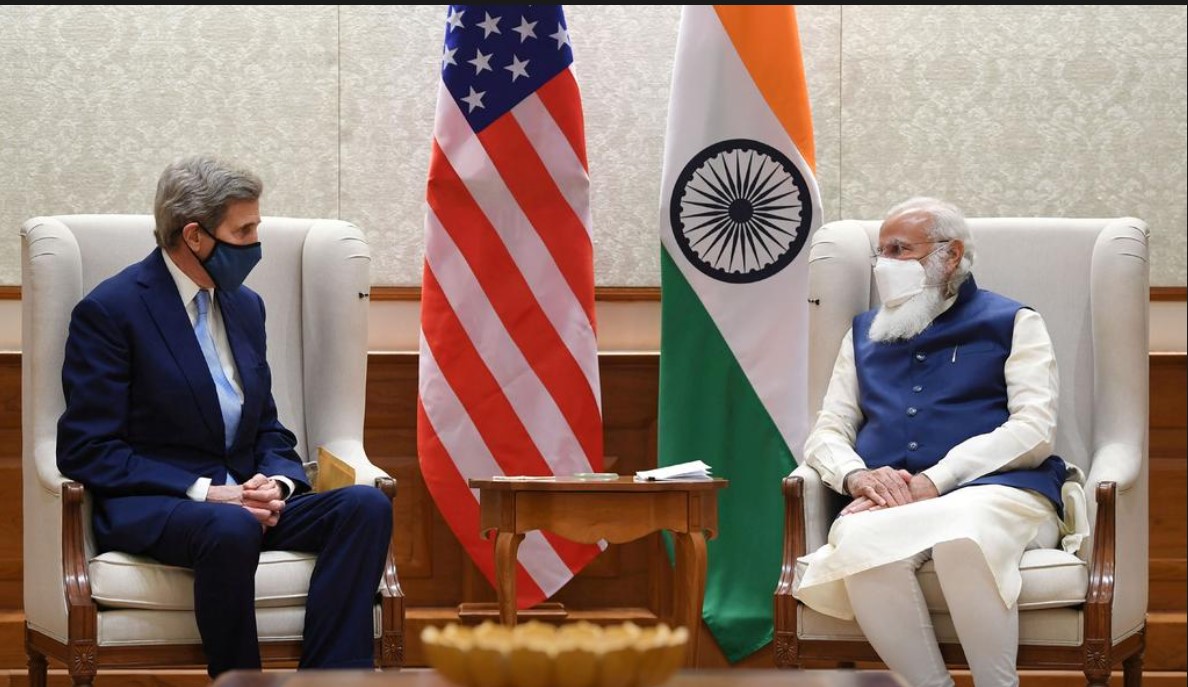(ATF) US climate envoy John Kerry met Indian Prime Minister Narendra Modi last week to urge him to pursue bolder climate change goals. The meeting was part of preparation for President Joe Biden’s plan to host 40 world leaders in a climate summit later this month.
Kerry, who flew to New Delhi for a three-day visit, promised Modi that the US would “bring more money to the table” and “facilitate concessionary finance” to fund the transition towards greener energy sources.
India is the world’s third biggest emitter of greenhouse gases after China and the United States, albeit with far lower emissions per capita than those countries.
Under the Paris Agreement targets and COP26, India pledged to reduce its greenhouse gas emissions by 33-35% below 2005 levels by 2050.
The country also promised to generate 40% of its power through renewable energy, and create a carbon sink capable of sucking in 2.5 billion-3 billion tonnes of carbon dioxide through additional forest and tree cover.
But Reuters has said Indian government sources revealed earlier that it was unlikely to bind itself to the 2050 goal as its energy demand was projected to grow more than any other country over the next two decades.
READ MORE: Pandemic and weather help coal reassert its dominance in India
The country is now under pressure from the US and Britain to commit to agreed target of decarbonising its economy.
“India’s role is crucial in dealing with global climate change,” Kerry said.
“First, India is a leading democracy together with US. It is also a nation known for its humanistic values and can contribute significantly to solving the problem,” he added.
Kerry promised to fulfil Washington’s earlier commitments towards developing countries including a $3 billion contribution to the Green Climate Fund.
In 2017 the Trump administration pulled out of the Paris agreement (UNFCCC) on climate change in a move that hurt America’s credibility and after the former president turned his back on science, Kerry said.
“India is a great nation of innovation, research and development. A partnership between US and India in an effort to discovery of new technologies is needed to deal with climate change,” he said.
MAKING UP
“The US comes back to the table understanding this obligation, understanding what we need to do, we come back with humility. We come back knowing that for the last four years we’ve disappointed people,” he added, but noted that many US states and cities had stayed the course on climate change mitigation despite Trump’s withdrawal from the international agreement.
Kerry also said he and Modi agreed to collaborate on a 2030 agenda with a focus on a clean and green agenda though enhancing availability of climate finance, building resilient infrastructure, energy storage and green hydrogen.
“Our challenge in the course of the next month is to get more people engaged in 2020 to 2030. That’s what President Biden is trying to do with the summit that he’s hosting, where he’s asking nations to up their ambition,” Kerry said.
INDIA’S IMPORTANCE
Biden’s Leaders Summit, which will bring together 40 world leaders, including PM Narendra Modi, seeks to “galvanise efforts by the major economies to tackle the climate crisis”.
“The Leaders Summit on Climate will underscore the urgency – and the economic benefits – of stronger climate action. It will be a key milestone on the road to the United Nations Climate Change Conference (COP26) this November in Glasgow,” the White House said in a statement last month.
The US is expected to announce new, ambitious 2030 emissions targets under the Paris Agreement, and will encourage “leaders to use the summit as an opportunity to outline how their countries also will contribute to stronger climate ambition”.
“India has a key role in the fight against climate change as the world’s largest democracy”, Kerry said.
READ MORE:
Climate change poses challenge to financial stability, PBoC warns
“You’re seeing a tailwind in terms of climate change”
























